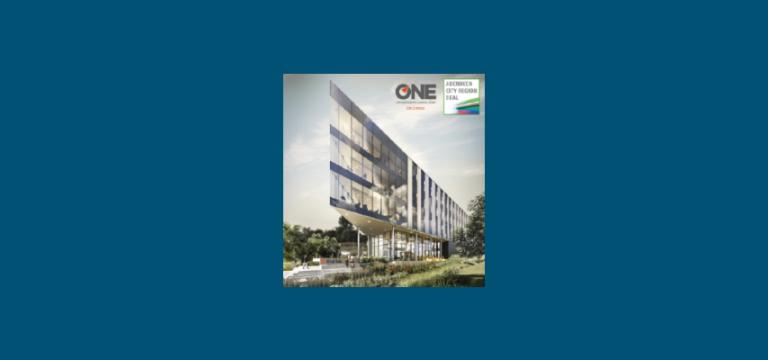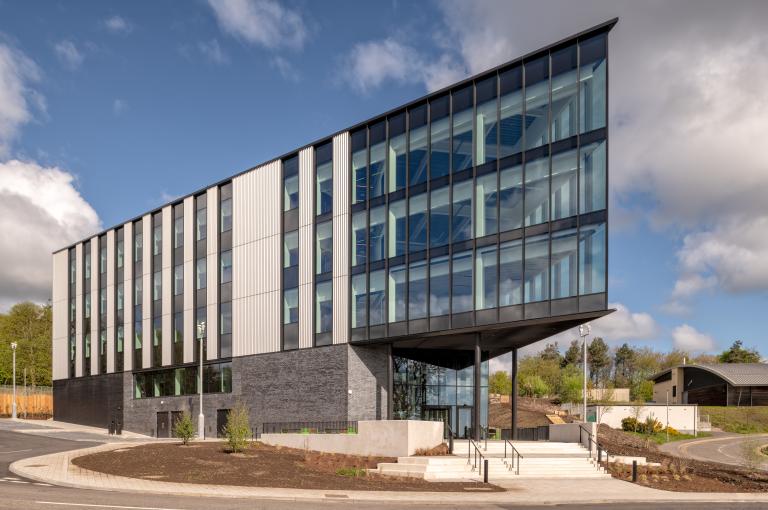
24 March 2021
Transformational BioHub project moves to main construction phase
Plans to make Aberdeen one of the most dynamic locations in the UK for life sciences company creation and growth drive ahead with BioHub entering its main construction phase.
BioHub's laboratory, incubation and collaboration space, custom accommodation, business support programmes, and access to expert networks and investors will accelerate scaling life sciences businesses and help spinouts and start-ups to commercialise innovation faster.
BioHub is a new-build project located on the city's Foresterhill Health Campus, one of Europe's largest integrated clinical, teaching, and research sites for healthcare and life sciences.
The main contractor for the project is Robertson Construction. The main construction phase is programmed to run through 2021 to summer 2022, followed by fit-out and the first phase opening to tenants in autumn 2022.
BioHub has secured £20 million of capital funding jointly provided by the UK Government and Scottish Government via the Aberdeen City Region Deal (ACRD). Opportunity North East (ONE) is the lead partner for the project and has committed up to £5.6 million to deliver BioHub's sector growth objectives. The ACRD is a partnership of both governments, Aberdeen City Council, Aberdeenshire Council and ONE. A new company, BioAberdeen Limited, has been formed to deliver BioHub. The project partners are ONE, the University of Aberdeen and NHS Grampian, and the ACRD.
Prof Stephen Logan, Chair of ONE Life Sciences and BioAberdeen said: "BioHub will provide the space, facilities and specialist support for start-ups and spinouts, early-stage and established life sciences businesses to grow, and anchor high-value jobs in the region for the long-term. BioHub will accelerate collaborative innovation and bring new therapies, products and services to market faster to transform healthcare delivery and produce better patient outcomes. It is the transformational sector project to grow the company cluster, drive regional economic diversification and recovery and develop the national health and wellbeing economy."
Life sciences is one of the economy's fastest-growing sectors. Aberdeen already has a cluster of companies developing solutions for modern health challenges ranging from Alzheimer's disease and antimicrobial resistance to cancer and diabetes, drawing on internationally-recognised expertise in biologics, medtech and digital health.
National and regional partners welcomed the project milestone and emphasised its importance to economic recovery and jobs for the future.
Cabinet Secretary for Transport, Infrastructure and Connectivity Michael Matheson said: "The Scottish Government is a full partner in the Aberdeen City Region City Deal, contributing £125 million over 10 years. The investment in this project through the Deal will contribute to the region's economic recovery by creating jobs, and providing the commercial infrastructure to support and attract businesses to Aberdeen and the surrounding areas. Projects like BioHub highlight the importance of this Deal and demonstrates the ability to provide support to the northeast life-sciences sector and diversify the regional economy."
UK Government Minister for Scotland, Iain Stewart, said: "The BioHub will deliver a huge boost to North East Scotland's life sciences sector, creating jobs and bringing businesses to the region. The UK Government is building back better from the pandemic by investing in sustainable and innovative projects for our communities. Across Scotland we have committed more than £1.5 billion to growth deals to ensure every region benefits."
Councillor Jenny laing, Chair of the Aberdeen City Region Deal Joint Committee and Co-Leader of Aberdeen City Council, said: "BioHub is a key project for the city region as we look ahead to economic recovery and growth. Life sciences is a priority high-value sector and this project – supported by the Aberdeen City Region Deal – will ensure that more life sciences companies grow and stay here, transforming healthcare, creating new jobs and training opportunities and delivering value for our economy."
Aberdeenshire Council Chief Executive, Jim Savege said: "With a reputation for innovation, this region is known for being world-leading in health research and this project will enable us to anchor and grow our globally important life sciences sector and in turn attract inward investment. It is great to see work underway on this particular project."
Professor Caroline Hiscox, NHS Grampian Chief Executive, said: "There is a long tradition of collaboration between clinical staff, research professionals and life science companies here in the north-east. This purpose-built hub will provide a great setting to further that work and turn innovations into treatments and products that will benefit patients for years to come."
Marion Campbell, Vice-Principal, Research at the University of Aberdeen, said: "The University of Aberdeen is delighted to be a partner in the BioHub, providing fantastic new facilities for life science companies in the North East of Scotland, many of which spun out of the University and continue to collaborate with our researchers. This is tremendous opportunity for the North East to grow our innovative and thriving life science community."
Gordon Milne, Managing Director, Robertson Construction Eastern, said: "BioHub will be a new facility to support the growth of life science businesses. ONE has been driving diversification in the Aberdeen region to create opportunity and economic benefits, and as the construction partner of choice we will be delivering a high-quality building which will inspire and foster collaboration. In line with the aspirations of the project partners for economic recovery, and our own commitment to the communities where we work, we will be engaging with the local supply chain and SMEs, and providing local learning opportunities which will further enhance community benefits. Our delivery of both the facility and community benefits, will further enrich the legacy of BioHub."

